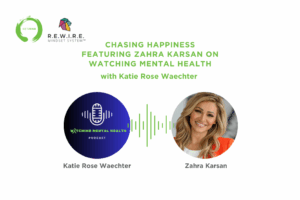Did you know that maintaining a healthy brain chemistry is the key to a great night’s sleep?
If you’re struggling with insomnia or poor sleep quality, it’s time to tackle this debilitating issue – because lack of sleep can rob us of happiness – affecting everything from our health and work to our relationships.
Our brain chemistry holds the key, and the good news is it’s possible to R.E.W.I.R.E. our minds for better rest using natural methods. While over-the-counter and prescription sleep medications may be helpful in the short term, adopting a few, simple lifestyle practices can transform your sleep quality – for life (no, side-effects!).
Here are my six top tips to naturally R.E.W.I.R.E. your brain chemistry, so that you can get the rest you need and deserve:
● Get moving
While exercise improves overall health, it’s also ESSENTIAL for a better, happier brain. There’s a direct link between physical activity and improved sleep, so it’s vital to get moving regularly. “Movement” can mean running, cycling, a gym session or favorite class – but just taking regular daily walks can be equally effective. When we exercise consistently, the brain releases helpful chemicals known as endorphins that relieve stress and bring the body and brain back into balance – so you can fall asleep naturally, without the aid of medication.
● Go easy on caffeine and alcohol.
Caffeine and alcohol disturb brain chemistry. Both substances suppress the production of serotonin, thereby leading to sleep disruption. For me, drinking coffee after midday is a no-no, since too much caffeine almost always disturbs my ability to sleep restfully. Each of us is different, but it’s worth paying attention to your caffeine and alcohol intake. With mindful intake – or avoidance – you may find your sleep problems are solved!
● Balance your blood sugar. (What time is dinner?)
High blood sugar can interfere with a good night’s sleep by causing insulin levels to spike, which, in turn, affects brain chemistry. The solution is to eat healthy, balanced meals – equally spaced throughout the day – and put a limit on processed foods like chips and cookies that can skyrocket insulin production. In addition, if you’re habitually eating a large meal late at night – within an hour or two before bed – you may find it more difficult to fall asleep as your brain and body go to work processing those nutrients instead of taking time out to rest and repair.
● Unwind with yoga or meditation.
Yoga and meditation are the best ways to reduce stress and induce relaxation and prepare the body and brain for sleep. These activities help center the mind and settle those looping thoughts that keep us up at night. Since a quiet mind is so vital for quality sleep, it’s worth adopting a slow yoga, meditation, or Qigong routine as a healthy pre-bedtime habit.
● Use music as your lullaby
Music has been proven to help relax the body and mind, enabling you to fall asleep and stay asleep. Use calming or relaxing music in the half-hour before you go to sleep – preferably instrumental tracks without lyrics that can potentially stimulate brain activity. In addition to soothing, instrumental music, special music integrated with binaural beats are one of my favorite tools for relaxation. These special tones – when pitched at a frequency of 3 Hz – have been proven to induce “delta” brainwaves – the frequency of deep sleep. (Different frequencies of binaural beats can also be used for better focus, creativity, stress relief and range of other issues).
● Keep a relaxing environment. (De-clutter!)
A cluttered environment can induce anxiety. Therefore, one of the simplest ways to boost sleep is to clean up your sleep environment and keep distracting items to a minimum. This includes the elimination of screens. Smartphones, TV’s and laptops all emit lots of light that disturb our natural circadian rhythms – so check them at the bedroom door! Instead, try to keep the bedroom as dark as possible … and also try waking up to natural light at sunrise, which will further help establish a healthy sleep/wake cycle.
Finally, my top R.E.W.I.R.E. tip for better rest is to make sleep a PRIORITY. Schedule a regular bed-time, just as you would any other important activity or appointment. Your happy brain will thank you. 🙂










